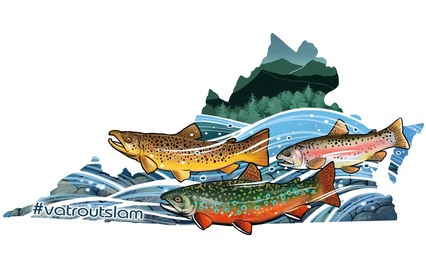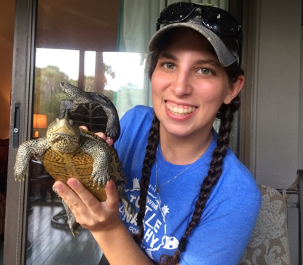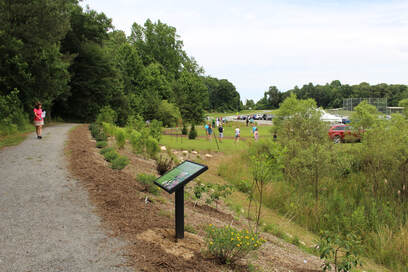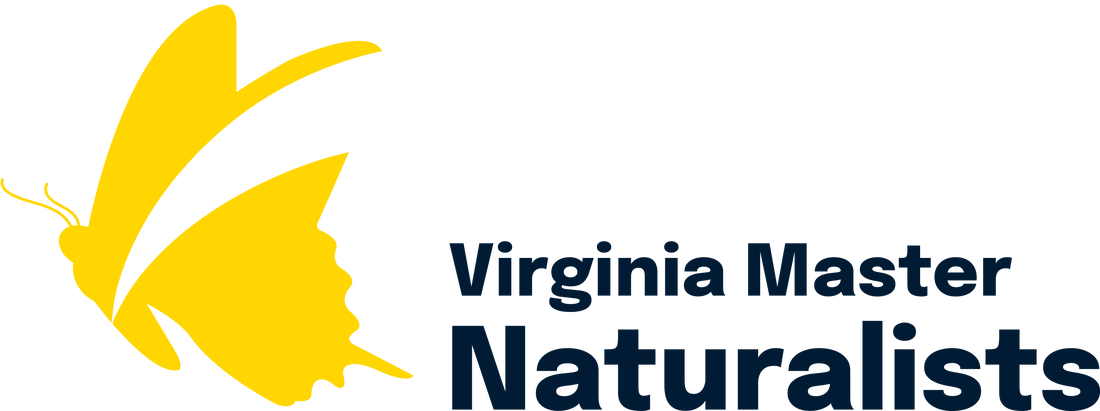
From the Virginia Department of Game and Inland Fisheries
VDGIF has launched a new fishing challenge this spring called the Virginia Trout Slam Challenge. It is a challenge for anglers to catch all three species of trout (Brook, Brown, and Rainbow) in the same day. The goal is to get anglers out to some of the lesser known trout waters and add a little adventure to their fishing experience. Check out the web page for more information.
--From Jason Hallacher, Region 4 Assistant Fisheries Biologist, VDGIF and VMN Chapter Advisor for the Headwaters Chapter.
VDGIF has launched a new fishing challenge this spring called the Virginia Trout Slam Challenge. It is a challenge for anglers to catch all three species of trout (Brook, Brown, and Rainbow) in the same day. The goal is to get anglers out to some of the lesser known trout waters and add a little adventure to their fishing experience. Check out the web page for more information.
--From Jason Hallacher, Region 4 Assistant Fisheries Biologist, VDGIF and VMN Chapter Advisor for the Headwaters Chapter.
 Meagan Thomas, DGIF Watchable Wildlife Biologist
Meagan Thomas, DGIF Watchable Wildlife Biologist Introducing Meagan Thomas
Meagan Thomas is DGIF’s newest watchable wildlife biologist who, along with Jessica Ruthenberg, will be leading Virginia’s Watchable Wildlife Program. Prior to her employment with DGIF, Meagan worked as a human-wildlife interactions biologist for the North Carolina Wildlife Resources Commission where she developed a variety of programs and materials centered on fostering positive wildlife interactions for constituents. Before that, Meagan coordinated research and education efforts related to reptile and amphibian conservation in the Southeast as the research manager for Davidson College. She brings with her a wealth of knowledge for creating effective citizen science and outreach programs, especially related to non-game species of wildlife. She obtained her M.S. degree in Biological Sciences at Eastern Illinois University where she conducted her thesis on snake dietary ecology. Additionally, she received two B.S. degrees from Towson University, majoring in Organismal Biology and Ecology as well as Animal Behavior.
Welcome, Meagan, on behalf of the 2,000+ wildlife watchers in the VMN program!
Meagan Thomas is DGIF’s newest watchable wildlife biologist who, along with Jessica Ruthenberg, will be leading Virginia’s Watchable Wildlife Program. Prior to her employment with DGIF, Meagan worked as a human-wildlife interactions biologist for the North Carolina Wildlife Resources Commission where she developed a variety of programs and materials centered on fostering positive wildlife interactions for constituents. Before that, Meagan coordinated research and education efforts related to reptile and amphibian conservation in the Southeast as the research manager for Davidson College. She brings with her a wealth of knowledge for creating effective citizen science and outreach programs, especially related to non-game species of wildlife. She obtained her M.S. degree in Biological Sciences at Eastern Illinois University where she conducted her thesis on snake dietary ecology. Additionally, she received two B.S. degrees from Towson University, majoring in Organismal Biology and Ecology as well as Animal Behavior.
Welcome, Meagan, on behalf of the 2,000+ wildlife watchers in the VMN program!
 Native demonstration landscaping and one of six new interpretive signs in Cedell Brooks Jr. Park in King George County, Virginia. Photo contributed by Virginia Witmer. More information on this project is at href: https://www.plantvirginianatives.org/cedell-brooks-jr-park-native-landscaping
Native demonstration landscaping and one of six new interpretive signs in Cedell Brooks Jr. Park in King George County, Virginia. Photo contributed by Virginia Witmer. More information on this project is at href: https://www.plantvirginianatives.org/cedell-brooks-jr-park-native-landscaping From the Virginia Department of Environmental Quality:
Making Natives the Norm: Regional Plant Campaigns Expand State-Wide
In 2009, prior to the Plant Eastern Shore Natives campaign, native plants were being described as scraggly and weedy. Ten years later, with native plants campaigns spreading state-wide, that perception is fading away garden by garden.
Thanks to the Virginia Coastal Zone Management (CZM) Program, led by the Virginia Department of Environmental Quality, in collaboration with more than 20 partner state agencies and non-governmental organizations, two new regional campaigns are under development. A Plant Southern Piedmont Natives campaign will first be piloted in the West Piedmont Planning District Commission. (The Plant Piedmont Natives campaign has been renamed Plant Northern Piedmont Natives.) A Plant Southwest Virginia Natives campaign will encompass the Roanoke and New River Valleys and includes the counties of Roanoke, Botetourt, Craig, Montgomery, Giles, Floyd and Pulaski, as well as, the cities of Roanoke, Salem and Radford.
“The growing state-wide initiative will continue the work in Virginia’s coastal zone, “says DEQ CZM Coordinator Virginia Witmer. “Using to the Flora of Virginia as a reference, the initiative helps landowners learn more about their property and the ecological benefits of a native plant landscape. Local garden centers are recruited to promote the native plants they currently carry and to increase the supply and variety of the native plants they carry. And we work with local jurisdictions to strengthen policies that favor native plant landscaping.”
Want to volunteer with the campaign in your area? Contact Virginia Witmer and she will connect you with the campaign coordinator for your region. Learn more about all the current regional campaigns and download all available regional guides at www.PlantVirginiaNatives.org.
--From Ann Regn, DEQ Communications Manager, and Virginia Witmer, Virginia Coastal Zone Management Program Outreach Coordinator
Making Natives the Norm: Regional Plant Campaigns Expand State-Wide
In 2009, prior to the Plant Eastern Shore Natives campaign, native plants were being described as scraggly and weedy. Ten years later, with native plants campaigns spreading state-wide, that perception is fading away garden by garden.
Thanks to the Virginia Coastal Zone Management (CZM) Program, led by the Virginia Department of Environmental Quality, in collaboration with more than 20 partner state agencies and non-governmental organizations, two new regional campaigns are under development. A Plant Southern Piedmont Natives campaign will first be piloted in the West Piedmont Planning District Commission. (The Plant Piedmont Natives campaign has been renamed Plant Northern Piedmont Natives.) A Plant Southwest Virginia Natives campaign will encompass the Roanoke and New River Valleys and includes the counties of Roanoke, Botetourt, Craig, Montgomery, Giles, Floyd and Pulaski, as well as, the cities of Roanoke, Salem and Radford.
“The growing state-wide initiative will continue the work in Virginia’s coastal zone, “says DEQ CZM Coordinator Virginia Witmer. “Using to the Flora of Virginia as a reference, the initiative helps landowners learn more about their property and the ecological benefits of a native plant landscape. Local garden centers are recruited to promote the native plants they currently carry and to increase the supply and variety of the native plants they carry. And we work with local jurisdictions to strengthen policies that favor native plant landscaping.”
Want to volunteer with the campaign in your area? Contact Virginia Witmer and she will connect you with the campaign coordinator for your region. Learn more about all the current regional campaigns and download all available regional guides at www.PlantVirginiaNatives.org.
--From Ann Regn, DEQ Communications Manager, and Virginia Witmer, Virginia Coastal Zone Management Program Outreach Coordinator


 RSS Feed
RSS Feed